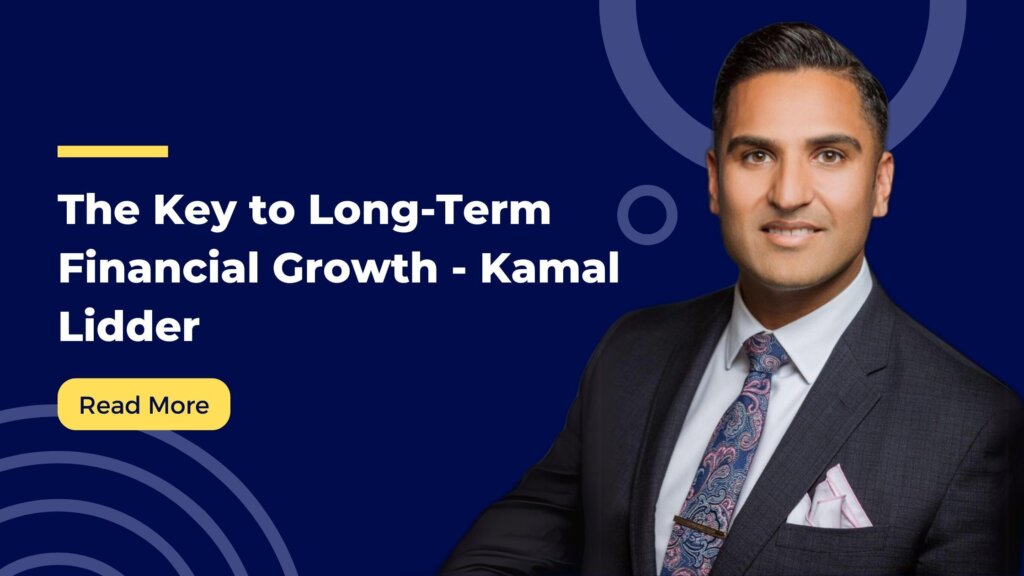Achieving financial growth is a long-term journey, not an overnight success. It requires careful planning, smart investing, and strategic decision-making. Kamal Lidder, a Senior Wealth Advisor at Canaccord Genuity Wealth Management, has spent years helping individuals build and maintain wealth. His approach focuses on personalized financial strategies that ensure long-term stability and growth.
Understanding Wealth Management
Wealth management is more than just making investments. It involves a holistic approach to handling finances, including budgeting, saving, investing, tax planning, and retirement strategies. Without a solid financial plan, it’s easy to fall into short-term traps that don’t contribute to sustainable wealth.
Kamal Lidder emphasizes the importance of a well-structured financial plan that considers personal goals, risk tolerance, and future needs. He believes that by following key principles, anyone can secure their financial future.
Key Principles of Long-Term Financial Growth
1. Smart and Diversified Investing
Investing wisely is essential for financial growth. However, investing isn’t just about buying stocks or real estate; it’s about creating a balanced portfolio that includes various asset types to minimize risks and maximize returns.
Tips for smart investing:
- Diversify investments across different industries and asset classes.
- Avoid putting all funds into a single stock or venture.
- Rebalance portfolios regularly to align with financial goals.
- Stay informed about market trends and economic conditions.
2. Effective Retirement Planning
Many people delay retirement planning, thinking they have time. However, starting early ensures financial security in later years. Kamal Lidder advises setting clear retirement goals and investing in retirement accounts such as RRSPs or 401(k) plans.
Retirement planning strategies:
- Start saving early to benefit from compound interest.
- Contribute to retirement funds consistently.
- Plan for potential healthcare expenses in retirement.
- Diversify income sources to ensure stability.
3. Tax Optimization Strategies
Tax planning plays a crucial role in financial growth. Without proper tax strategies, individuals might lose a significant portion of their earnings to taxes. Kamal Lidder advises leveraging tax-efficient investment strategies to legally minimize tax burdens.
Ways to optimize taxes:
- Invest in tax-advantaged accounts such as TFSA and RRSP.
- Use capital gains exemptions where possible.
- Consider tax-efficient estate planning to reduce inheritance taxes.
- Keep track of deductible expenses to lower taxable income.
4. Estate Planning for Future Generations
Estate planning ensures that wealth is passed down efficiently. Without a clear estate plan, families might face unnecessary legal issues and tax burdens. Kamal recommends working with financial advisors to set up wills and trusts to manage wealth transfer effectively.
Key aspects of estate planning:
- Draft a clear and legally valid will.
- Assign power of attorney and healthcare directives.
- Establish trusts for beneficiaries to minimize tax implications.
- Regularly update estate plans to reflect changing circumstances.
5. Risk Management and Insurance Planning
Life is unpredictable, and financial security depends on managing risks effectively. Insurance is a key component of a sound financial plan, protecting against unforeseen circumstances such as illness, accidents, or economic downturns.
Essential insurance coverage:
- Life insurance for family security.
- Disability insurance to protect against income loss.
- Health insurance to cover medical expenses.
- Property insurance for asset protection.
The Role of a Financial Advisor
Having a trusted financial advisor can make a significant difference in wealth management. Kamal Lidder’s approach is client-centric, ensuring that each financial strategy is tailored to individual needs.
Benefits of working with a financial advisor:
- Access to expert investment knowledge and strategies.
- Regular portfolio reviews to ensure alignment with goals.
- Personalized financial plans based on current and future needs.
- Support in navigating complex financial decisions.
Steps to Achieve Long-Term Financial Growth
Kamal Lidder suggests a step-by-step approach to achieving financial stability:
- Assess Current Financial Status – Understand income, expenses, assets, and liabilities.
- Set Clear Financial Goals – Define short-term and long-term financial objectives.
- Create a Budget and Savings Plan – Track spending and prioritize savings.
- Invest wisely and Diversify – Allocate funds across different asset classes.
- Plan for Retirement Early – Start contributing to retirement accounts as soon as possible.
- Implement Tax Strategies – Use tax-efficient investment options to reduce liabilities.
- Protect Wealth with Insurance – Ensure adequate coverage against risks.
- Develop an Estate Plan – Secure wealth transfer for future generations.
- Monitor and Adjust Plans Regularly – Stay flexible and adapt to financial changes.
Conclusion
Building long-term financial growth is a continuous process that requires discipline, planning, and informed decision-making. Kamal Lidder’s expertise in wealth management provides valuable insights into investment strategies, retirement planning, tax optimization, and risk management.
By following these principles and seeking guidance from financial professionals, individuals can secure their financial future and achieve lasting prosperity.

